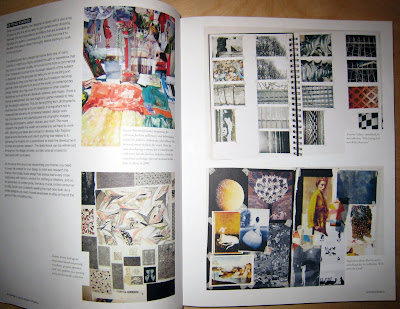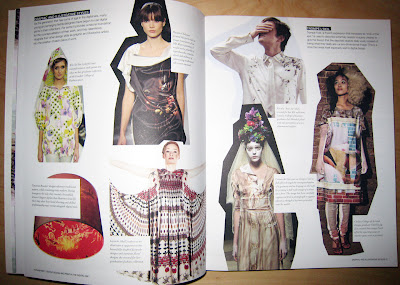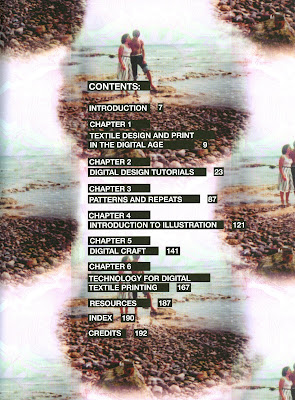
In my last Amazon.com shipment, I purchased a few different design books. One that I would like to share with you today in this book review is called
Digital Textile Design, by
Melanie Bowles and
Ceri Isaac. This book contains a plethora of wonderful information ranging from current and future textile industry printing techniques and technical knowledge, to a range of Photoshop and Illustrator tutorials with a focus on creating textile patterns.

This book is a must read for anyone interested in the textile industry, printing techniques and wants to learn how to put patterns into repeat in Photoshop and Illustrator. I would recommend though that you have a standard knowledge of Illustrator and Photoshop in order to follow along with the tutorials. For more experienced Textile Designers who currently work in these programs and in the industry, the tutorials will likely be things you already know. There is however so much wonderful industry information, that I found it quite engaging, and learned quite a bit, even with being in the industry for over 10 years.

The last few seasons, the runways have been overrun by unique and jaw-dropping digital prints. See the
Basso & Brooke collection from the Fall/Winter 2009 runways to get a glimpse of the fascinating and amazing full garment prints that are happening. (I have also blogged about it in my previous post). Digital printing is infiltrating the fashion industry, and year after year the prices are inching down little by little so that someday, hopfully, the world can do more digital printing at a mass-market level.
 Example of Basso & Brooke digital printing from the Fall/Winter 2009 runway
Example of Basso & Brooke digital printing from the Fall/Winter 2009 runway
It's quite inspiring to see what can be achieved with digital printing, as well as types of prints and repeats, that you are not able to achieve with traditional methods of printing. Digital printing opens the door for the textile designer to a whole new world, which will allow for a lot of creative growth. I'm excited to see what happens in the industry!

For the book review, I want to give you in-depth information regarding what's inside in order to help you decide if it is the book for you. Below I have listed the tutorials included. I have also posted images of
Tutorial 20 on Amazon.com, so you can read through it step by step to see how they are written. Ok, here we go!
CHAPTER 1: Textile Design and Print in the Digital Age
This chapter introduces and explains digital printing in the fashion industry.
CHAPTER 2: Digital Design Tutorials
- Tutorial 1: Using Filters in Photoshop
- Tutorial 2: Creating Complex Color Blends (Illustrator)
- Tutorial 3: Building Floral Motifs ( (Illustrator)
- Tutorial 4: Cross-stitch Effects (Illustrator)
- Tutorial 5: Engineered Prints (Photoshop)
- Tutorial 6: Sequin Effects (Photoshop)
- Tutorial 7: Photomontage (Photoshop)
- Tutorial 8: Building a Brush Palette (Photoshop)
- Tutorial 9: Textured Effects (Photoshop)
- Tutorial 10: Creating a Color Palette (Photoshop)
CHAPTER 3: Patterns and Repeats
- Tutorial 11: Photoshop Basic Block Repeat
- Tutorial 12: Photoshop Block Repeat with Offset Filter
- Tutorial 13: Photoshop Simple Half-Drop Motif
- Tutorial 14: Photoshop Half-Drop Repeat
- Tutorial 15: Photoshop Gingham
- Tutorial 16: Photoshop Creating Stripes
- Tutorial 17: Illustrator Basic Pattern Swatch
- Tutorial 18: Illustrator Diamond Pattern
- Tutorial 19: Illustrator Plaid Patterns
- Tutorial 20: Illustrator Half-Drop
CHAPTER 4: Introduction to Illustration
- Tutorial 21: Texture-Mapping with the Pen Tool
- Tutorial 22: Texture-Map and Line Drawing
- Tutorial 23: Creating Graphic Silhouettes
CHAPTER 5: Digital Craft
This chapter includes information on combining digital techniques with traditional artistic methods. For example, hand painting & digital print, screen printing & digital print, foiling & flocking with digital print, digital print onto vintage fabrics, and many more. There are also Designer Profiles on
Patricia Belford,
Helen Amy Murray and
Rebecca Earley.
CHAPTER 6: Technology for Digital Textile Printing
This chapter covers textile printing methods and technology for both traditional and digital printing. There is also a little bit of information regarding CAD software options, and how to work with color with regards to color management.
Whew! Ok, that was pretty in-depth! I hope after reading this review you are as excited about this book as I am! Enjoy!






